Share
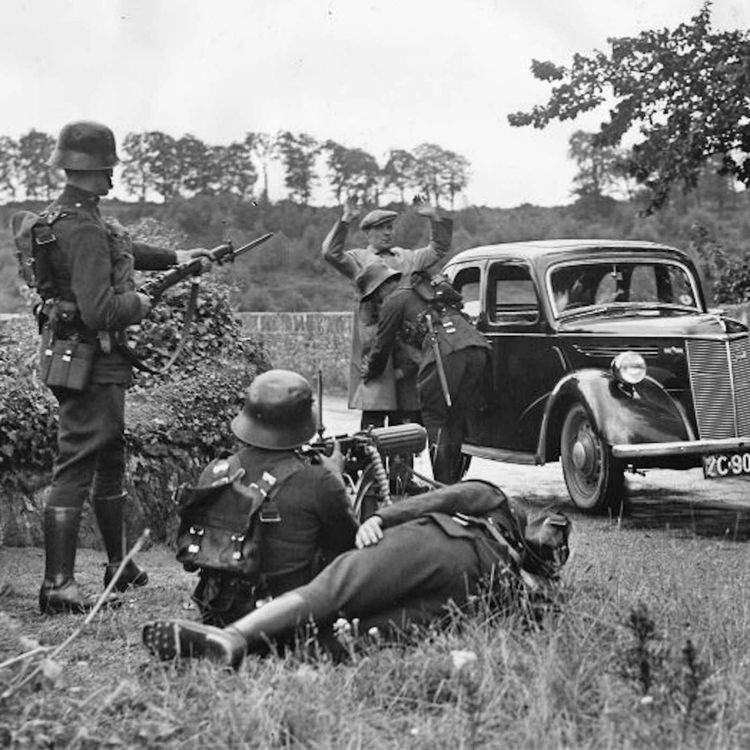
Irish History Podcast
The Hunt for Nazi Spies in World War II
•
While Ireland remained neutral in the Second World War several Nazi agents were smuggled into the country. Their aims varied, some sought to establish contact with the IRA while others were spies.
In this episode, I interview historian Marc McMenamin about the attempts of Irish Military Intelligence's to catch these spies and agents.
Marc also explains the attitude of the IRA towards these individuals & the forgotten Irish code breakers in the war.
Its a fascinating story.
Marc has published two books on Irish Military Intelligence in the Second World War Codebreaker & Ireland's Secret War both of which are fantastic reads.
More episodes
View all episodes
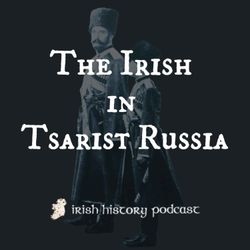
Irish Emigrants in Tsarist Russia: A History
40:12|Margaretta Eagar is a little-known figure in Irish history. In the early 20th century, she worked as a governess to the last Romanov Tsars of Russia. Eagar was just one of thousands of Irish people who emigrated to Imperial Russia. In this episode, historian Angela Byrne joins me to discuss why these Irish emigrants went east. Our fascinating conversation takes you from 17th-century political exiles to 19th-century tourists and, of course, the gripping story of Margaretta Eagar.Our discussion is based around Angela’s book Anarchy & Authority: Irish Encounters with Romanov Russia. You can get your copyhttps://www.lilliputpress.ie/products/anarchy-and-authority?srsltid=AfmBOoqFNCTW-O6aWqZx2WSnQ_L9j9ZCKLSfk55XAz_BqJWs1_TKzK2yAngela's website: www.historianka.comFollow Angela on Instagram @angela_historiankaSupport the Irish History Podcast and get an ad-free version of the show at https://patreon.com/irishpodcast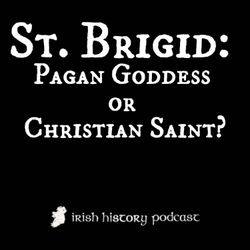
St Brigid: Pagan Goddess or Christian Saint?
12:57|St. Brigid is one of Ireland's most well-known saints. While Christian churches have experienced a crisis of faith in recent decades, she seems to buck the trend. People of all faiths and none can identify with this figure. In this short episode, I explore the history of St. Brigid, asking if she was a Christian saint or a pagan goddess and why she continues to relate in the 21st century.Sound by Kate Dunlea.Read more about St Brigid at https://www.dib.ie/biography/brigit-brighid-brid-bride-bridget-a0961Support the show at https://patreon.com/irishpodcast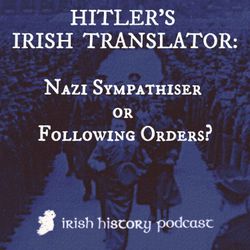
Hitler's Irish Translator: Nazi Sympathiser or Following Orders?
38:47|In March 1939, James Murphy, a Cork man, became a wanted figure in Nazi Germany. As Europe hurtled towards war, Murphy published an unedited English translation of Hitler’s notorious book, Mein Kampf, which revealed Hitler’s long-held intentions to invade Eastern Europe. However, Murphy's story is complicated. Often presented as an opponent of the Nazis, he had also, for a time, worked in the Third Reich.The full story behind the translation is intriguing. It reveals how Murphy was manipulated by a secret anti-Nazi group known as the Red Orchestra. It also explores why Murphy, who was aware of many of the darker aspects of the Nazi regime, did not draw attention to them.Sound: Kate DunleaAdditional Narrations: Aidan CroweSupport the show and get an ad-free version of the episode at Patreon.com/irishpodcast.Selected Sources: Maume P. Murphy, James Vincent, Dictionary of Irish Biography https://www.dib.ie/biography/murphy-james-vincent-a6080Barnes, J. & P. James Vincent Murphy: Translator and Interpreter of Fascist Europe, 1880-1946Evans, R. The Hitler Conspiracies The Third Reich and the Paranoid ImaginationMurphy James: Adolf Hitler; the drama of his career https://archive.org/details/Bellerophon5685_yahoo_AHDC/page/n69/mode/2up?q=JewsMurphy, John Why did my grandfather translate Mein Kampf? https://www.bbc.com/news/magazine-30697262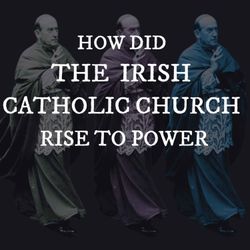
The Irish Catholic Church: How did it become so powerful?
38:37|Over the past three decades, the Catholic Church has been engulfed by numerous sexual abuse scandals and accusations of power abuse. This has prompted many to question how it initially gained such influence in Ireland. In this podcast, I delve into the history of the Catholic Church within modern Irish society. While its influence is often linked to the post-Irish Independence era of the 1920s, the foundations of Catholic power extend much further back. This episode charts the Church's dramatic rise since the 1780s, when it emerged from the Penal Laws and decades of repression. I reveal how it skillfully navigated through rebellions, the Great Hunger, and the struggle for independence, growing stronger with each crisis. Additionally, I explore the complex relationship between the Church and the British Empire, where bitter enmity in the 1700s transformed into a strategic partnership—a marriage of convenience that reshaped Irish history.Support the show at Patreon.com/irishpodcast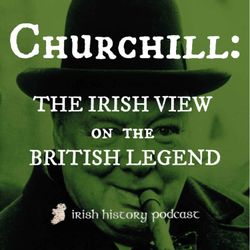
Winston Churchill: The Irish View on a British Legend
32:50|Winston Churchill is one of the most famous figures of the 20th century. Hailed in Britain as the man who won the war, his legacy in Ireland is far more complex. In this episode, I delve into history behind the celebrated war hero who saved Britain who was also a staunch imperialist with a controversial past. Join me as I navigate the contrasting narratives and attempt to reconcile these two sides of a towering historical figure.Support the show at patreon.com/irishpodcastLet me know what you think at info at Irishhisitorypodcast.ie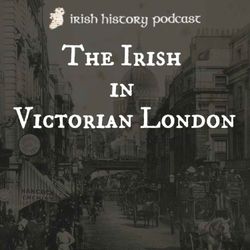
Irish Lives in Victorian London: History and Influence
44:45|Victorian London was a city of immense wealth, but also shocking poverty. The historian Jerry White described it as "a metropolis of wealth, grandeur, culture, and sophistication alongside a hell of starving, degrading, and heart-rending poverty." The largest city in the world at the time, London was also home to tens of thousands of Irish emigrants. While there was a wealthy Irish elite, the vast majority were poor labourers.While surviving the daily grind of life in the slums of the Victorian city, they also faced suspicion and racism.In this podcast, historian Breda Corish shares their stories based on her research in the Whitechapel area of the city.A graduate of University College London, Breda's research focuses on the Irish in London over the centuries. You can read her work on her website www.irishlondonhistory.com. Follow her on social media at @N16Breda on Twitter and BlueSky @n16breda.bsky.social.Support the show at www.patreon.com/irishpodcast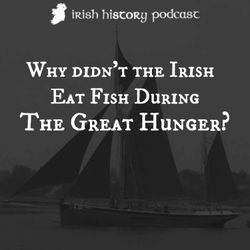
Why Didn't Irish People Eat Fish During the Great Hunger?
30:54|During the Great Hunger of the 1840s, one million Irish perished from starvation and hunger-related diseases. However, Ireland is surrounded by some of the best fishing grounds in Europe. This begs the question: why didn't the Irish turn to the sea to survive?Some have argued that our ancestors didn't know how to fish or that they didn't like fish. The answer is, unsurprisingly, a little more complicated.This podcast delves into the complex historical, economic, and social factors that contributed to the tragic paradox of people starving in a sea of plenty.All 23 chapters of my book Life in Medieval Ireland is available for show supporters on Patreon here https://www.patreon.com/posts/life-in-medieval-116757407. (If you support the show on Acast+ I will post the book tomorrow. Its a little tricky to post 23 chapters without clogging up your feed!)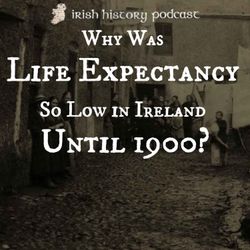
Why Was Life Expectancy So Low in Ireland Until 1900?
37:25|Life expectancy in Ireland has doubled over the past 200 years, but why was it so low for so long? In this podcast, I delve into the factors that kept life expectancy down in Ireland's history and what those numbers truly mean. Did people really only live to 40 in the past? During the Great Hunger, life expectancy plummeted to just 20 years—what does this reveal about society at the time? Join me as I explore these questions and discuss what I believe to be one of humanity's greatest achievements: the remarkable doubling of life expectancy in recent times. Support the show at https://patreon.com/irishpodcast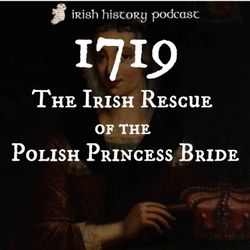
1719: The Irish Rescue of the Polish Princess Bride
32:12|In 1719, the 17-year-old Polish Princess Maria Clementina Sobieska was seized by the Holy Roman Emperor Charles VI. While the move shocked many in Europe, in the following months a group of Irish exiles plotted a daring rescue of Maria Clementina. This led to a dramatic 400-kilometer chase across 18th-century Europe.In this episode, I am joined by historian Richard Maher, an expert in the area, who explains why Irish exiles, known as the Wild Geese, risked their lives to rescue this Polish princess and how they hoped she might change the course of Irish history.You can follow Richard on Linkedin at https://ie.linkedin.com/in/richard-maher-a5ab8068Subscribe to my new podcast with historian Damian Shiels. Its called Transatlantic - An Irish American History Podcast. You can hear the latest episode here https://linktr.ee/transatlanticpod